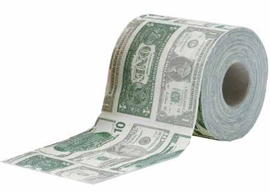
August 02, 2011

Yet, in celebrating, Republicans and the Tea Party true believers need to know: This country is not out of the woods. Far from it.
Standard & Poor’s has looked at the deal, less than $3 trillion in cuts over 10 years of budgets already bumping up against $4 trillion a year, and concluded: The U.S. government has failed.
An S&P downgrade of our triple-A bond rating may be at hand.
And last week came news that, instead of the anticipated 1.8 percent growth in the second quarter of 2011, growth came in at 1.4 percent. More shocking, the first quarter’s 1.9 percent growth was revised downward to 0.4 percent.
Thus, in the first half of 2011, America grew at an annual rate of less than 1 percent—not enough to create the jobs needed for those entering the workforce, let alone for the 16 percent of workers now unemployed or underemployed.
This anemic January-to-July figure means that growth in fiscal year 2012, which begins in October, will be lower than projected, as will the tax revenues flowing into the Treasury.
Bottom line: Despite the debt-ceiling battle that convulsed this city, the final deal will achieve neither the deficit nor debt reduction we thought. Notwithstanding the Tea Party victory, we continue drifting toward the falls.
And as that happy warrior of the political battlefield, Ron Paul, reminds us, we are inevitably going over—into default.
Only that default will not take the dramatic form of a U.S. refusal to redeem T-bills or halt interest payments on Treasury bonds.
We Americans are not going the Argentine route.
Rather, we will, as we are doing today, slowly destroy the value of our dollar as an international medium of exchange. Unlike Greece, which cannot print euros to pay debts, we can print dollars to service ours.
Beijing will be made to accept dollars of a purchasing power far less than that of the dollars they lent to us. We are going to cheat them.
Already this year, the dollar has lost 30 percent of its value against the Swiss franc and plunged against the yen and Canadian dollar. And in The Wall Street Journal, Harvard economist Martin Feldstein celebrates the news that the dollar is slowly dying, for it means that U.S. exports are that much cheaper for foreigners to buy.
One wonders what men like Douglas MacArthur and Dwight D. Eisenhower would think of a 21st century America whose elites rejoice in the news that the U.S. dollar is less valued and less respected in the world than in the America they fought to defend.